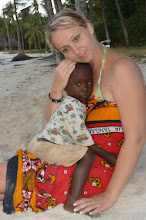DOL-DOL, 5 October 2009 (IRIN) - Traditionally, life for women in pastoralist communities in the central Kenya region of Laikipia revolves around taking care of their children, leaving the men to provide for the family. However, a prolonged drought in the area, which has resulted in significant livestock deaths, has seen these roles reversed, with more women venturing into small-scale business to feed their families. Government officials estimate that at least 600,000 livestock (cattle, sheep and goats) have died in the past three months in the area. Dorcas Piroris, 50, from Olkinyei in Laikipia North District, is selling tourist trinkets to supplement her family’s income. She spoke to IRIN in the town of Dol-Dol on 5 October:
"This is the worst year that I have witnessed in my life; everything seems to be going against tradition and we do not know when things will improve.
"As you can see, there are no animals around this place. When the livestock started dying due to drought, our men took them far away to Mt Kenya in search of pasture. Some people had lost more than half of their herds by the time they left for the mountain.
"After a very long journey, some of our men, including my husband Solomon Lelongo, came back empty-handed; all the animals had died in the forest due to the cold, harsh weather there.
“As a result, an [NGO] mobilized women to seek alternative ways of feeding their families as we wait for the rains. I started selling these wares [walking sticks, leather belts and other items, all decorated with colourful beads] to get cash to buy essentials for my husband and our seven children because the relief supplies of maize, beans and oil that we get from the government and other donor agencies are not enough.
“I am finding it difficult since all along, since my childhood when I was married off by my parents, I have been relying on my husband to provide for me and these wares were the preserve for people with curio shops.
“I and some of my friends have yet to get used to the new role and we are hoping it will rain soon so that things can go back to the way they were.
"Life is difficult since most people do not have money to buy our wares. We usually send some of our colleagues and young men to Nairobi or Nakuru to buy the materials we use to make these wares. Some of us have yet to recoup what we initially spent when we started this job, nearly two months ago.
“The major problem is getting customers because we do not have a selling point like those in curio shops. We rely on people to come to our homes. The few who do, buy our wares cheaply, thereby giving me a very small profit margin.
“Today, I came to Dol-Dol following an invitation by a group [an NGO] that came up with this idea and assisted us in starting this business.
“Although it is dry at times, I have never witnessed a situation where we are forced to buy milk for our children as is the case now. How I hope it will rain soon."
wm/js/mw
1. novembra 2009
Prihlásiť na odber:
Zverejniť komentáre (Atom)

Žiadne komentáre:
Zverejnenie komentára